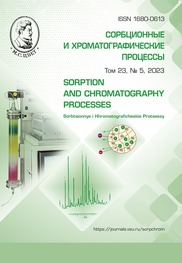Chromatographic separation of itaconic anhydride recycling products with 5-amino-1-phenylpyrazoles
Abstract
An important role in the creation of the entire variety of modern physiologically active compounds is played by the synthesis of complexly constructed poly–substituted molecules – analogues of natural substances. Effective design methods involve a significant increase in molecular complexity with a minimum number of stages. However, such an approach often involves complex processes involving multifunctional reagents, which, ultimately, can lead to difficult-to-separate mixtures of the target compound and a number of by-products, both undesirable and promising. This problem remains very significant in the design of various polyazaheterosystems, including those with a pyrazolopyridine skeleton, which is one of the most common fragments in the structures of natural and synthetic biologically active compounds. Therefore, an urgent task is to develop effective methods for the separation of such mixtures and purification of target compounds. Currently, column chromatography is used to solve it, which is one of the most important methods for separating liquid or solid mixtures of organic substances on a preparative scale. In this paper, the reactions of itacone anhydride with substituted 5-amino-1-phenylpyrazoles are investigated, a chromatographic method for separating alternative interaction products and their identification is proposed.
Downloads
References
Witherington J., Bordas V., Garland S. L., Hickey D. M., Ife R. J., Liddle J., Ward R. W. 5-Arylpyrazolo [3, 4-b] pyridines: potent inhibitors of glycogen synthase kinase-3 (GSK-3). Bioorganic and medicinal chemistry letters. 2003; 13(9): 1577-1580.
Chavva K., Pillalamarri S., Banda V., Gautham S., Gaddamedi J., Yedla P., Banda N. Synthesis and biological evaluation of nov-el alkyl amide functionalized trifluoromethyl substituted pyrazolo[3,4-b]pyridine derivatives as potential anti-cancer agents. Bioorg. Med. Chem. Lett. 2013; 23(21): 5893-5895. https://doi.org/10.1016/j.bmcl.2013.08.089
Ghaedi A., Bardajee G.R., Mirshokrayi A., Mahdavi M., Shafiee A., Akbarzadeh T. Facile, novel and efficient synthesis of new pyrazolo[3,4-b]pyridine products from conden-sation of pyrazole-5-amine derivatives and activated carbonyl groups. RSC advances. 2015; 5(109): 89652-89658. https://doi.org/10.1016/j.bmcl.2013.08.089
Selleri S., Bruni F., Costagli C., Cos-tanzo A., Guerrini G., Ciciani G. Martini C. Synthesis and benzodiazepine receptor affinity of pyrazolo [1, 5-a] pyrimidine derivatives. 3. New 6-(3-thienyl) series as α1 selective ligands. Journal of medicinal chemistry. 2003; 46(2): 310-313.
Gavrin L.K., Lee A., Provencher B.A., Massefski W.W., Huhn S.D., Ciszewski G.M., McKew J.C. Synthesis of pyrazolo [1,5-α] pyrimidinone regioisomers. The Journal of Or-ganic Chemistry. 2007; 72(3): 1043-1046. https://doi.org/10.1021/jo062120g
Moy F.J., Lee A., Gavrin L.K., Xu Z.B., Sievers A., Kieras E., Tsao D.H. Novel synthesis and structural characterization of a high-affinity paramagnetic kinase probe for the identification of non-ATP site binders by nu-clear magnetic resonance. Journal of medicinal chemistry. 2010; 53(3): 1238-1249. https://doi.org/10.1021/jm901525b
Morley A.D., Pugliese A., Birchall K., Bower J., Brennan P., Brown N., Wyatt P.G. Fragment-based hit identification: thinking in 3D. Drug Discovery Today. 2013; 18(23): 1221-1227. https://doi.org/10.1016/j.drudis.2013.07.011
Paterson I., Anderson E.A. The renais-sance of natural products as drug candidates. Science. 2005; 310(57): 451-453. https://doi.org/10.1126/science.1116364
Cuenda A., Sanz-Ezquerro J.J. p38γ and p38δ: from spectators to key physiological players. Trends in biochemical sciences. 2017; 42(6): 431-442.
Emelina E.E., Petrov A.A., Firsov A.V.A. 5-Aminopyrazoles in the synthesis of heterocycles. Intermediates of the reaction of 5-aminopyrazoles with trifluoroacetylacetone. Journal of Organic Chemistry. 2003; 39(2): 299-301.
Chebanov V.A., Saraev V.E., Desenko S.M., Chernenko V.N., Shishkina S.V., Shish-kin O.V., Kappe C.O. One-pot, multicomponent route to pyrazoloquinolizinones. Organic Letters. 2007; 9(9): 1691-1694. https://doi.org/10.1021/ol070411l
Quiroga J., Hormaza A., Insuasty B., Saitz C., Cañete A., Jullian, C. Synthesis of pyrazolo[1,5‐a]pyrimidines in the reaction of 5‐amino‐3‐arylpyrazoles with methoxymethylene meldrum's acid derivatives and thermolysis of their pyrazolylaminomethylene derivatives. Journal of heterocyclic chemistry.1998; 35(1): 61-64. https://doi.org/10.1002/jhet.5570350112
Quiroga J., Insuasty B., Hormaza A., Cabildo P., Claramunt R. M., Elguero, J. Syn-thesis, Molecular Structure and Tautomerism of 1(2)H-Dihydropyrazolo[3,4-b]pyridin-6-ones. Heterocyclic Communications. 1999; 5(2): 115-122.
Shmoylova Y.Y., Kovygin Y.A., Ko-sheleva E.A., Shikhaliev K.S., Ledenyova I.V., Prezent M.A. Efficient synthesis of tetrahydro-1H-pyrazolo[3,4-b]pyridines based on the recy-clization of N-arylitaconimides with aminopyrazoles. Mendeleev Communications. 2022; 32(5): 688-690. https://doi.org/10.1016/j.mencom.2022.09.041
Li J., Zhou G., Hong Y., Wang C., He W., Wang S., Chen Y., Wen Z., Wang Q. Co-polymer of pyrrole and 1, 4-butanediol diglyc-idyl as an efficient additive leveler for through-hole copper electroplating. ACS Omega. 2020; 5: 4868-4874. https://doi.org/10.1021/acsomega.9b03691
Yang S., Thacker Z., Allison E., Ben-nett M., Cole N., Pinhero P. Electrodeposition of copper for three-dimensional metamaterial fabrication. ACS Appl mater interfaces. 2017; 9(46): 40921-40929. https://doi.org/10.1021/acsami.7b04721
Yavari I., Sirouspour M., Souri S. One-pot synthesis of functionalized 4-oxo-2-thioxo-1, 3-thiazinanes from primary amines, CS 2, and itaconic anhydride. Molecular diversity. 2010; 14(55): 611-615. https://doi.org/S0040-4020(99)00386-5
Medway A.M., Sperry J., Heterocycle construction using the biomass-derived build-ing block itaconic acid. Green Chemistry. 2014; 16(4): 2084-2101. https://doi.org/10.1039/C4GC00014E
Alizadeh A., Zarei A., Rezvanian A. One‐Pot Synthesis of 4‐(2,3‐dihydro‐2‐hydroxy‐1,3‐dioxo‐1H‐inden‐2‐yl)‐substituted 1‐aryl‐1H‐pyrazole‐3‐carboxylates via a tandem three‐component reaction. Helvetica Chimica Acta. 2012; 95(2): 278-281. https://doi.org/10.1002/hlca.201100317
Chakrabarti S., Panda K., Misra N. C., Ila H., Junjappa H. Aza-annulation of polarized N, S-and N, N-ketene acetals with itaconic anhydride: Synthesis of novel functionalized 1,2,3,4-tetrahydro-2-pyridones and related azabicycles. Synlett. 2005; 9: 1437-1441. https://doi.org/10.1055/s-2005-868491







